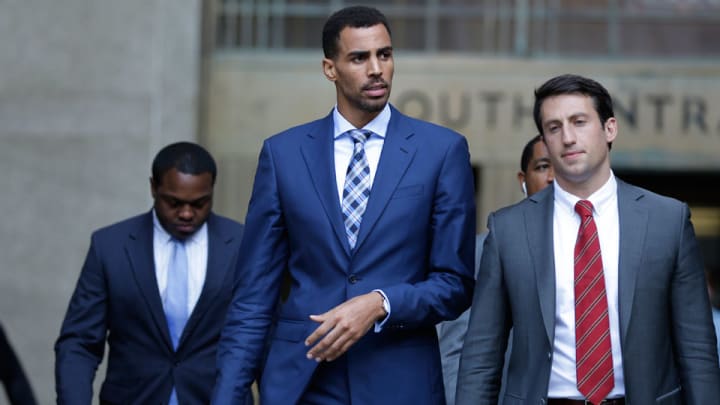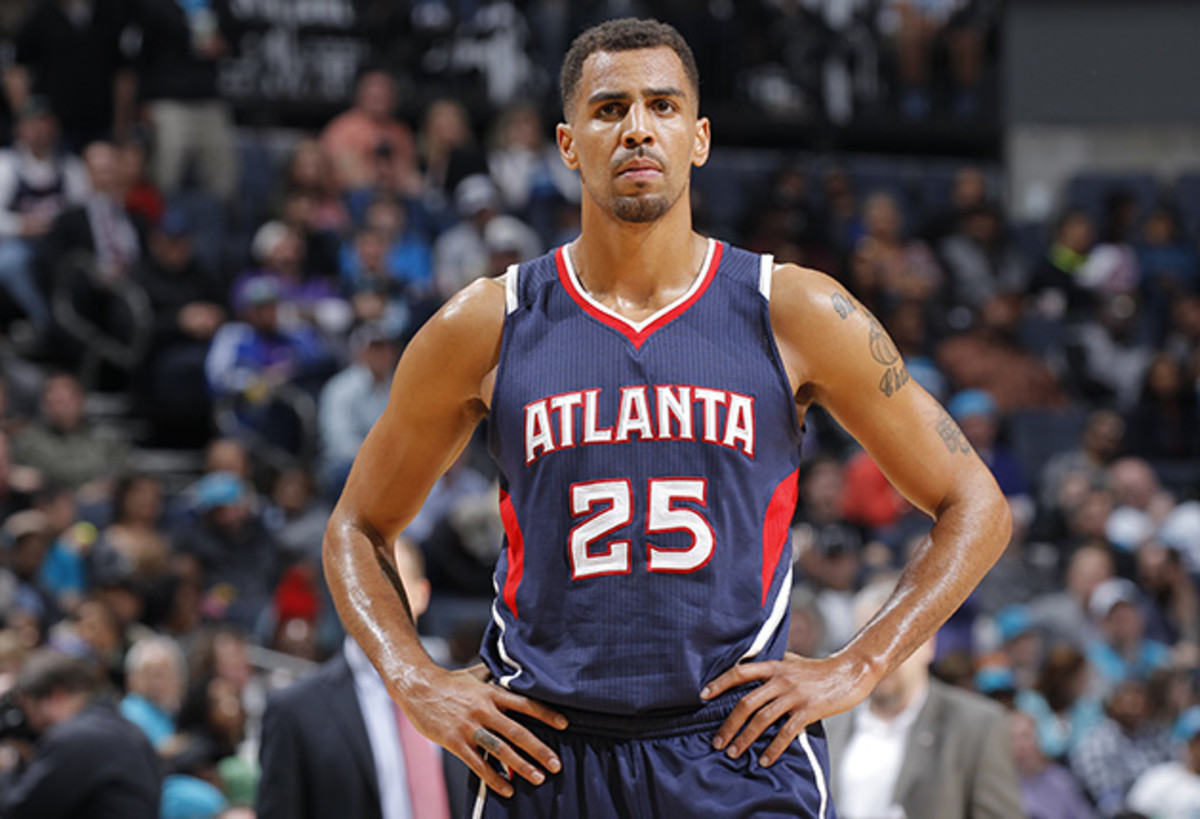Hawks' Thabo Sefolosha takes risk, reaps reward with not guilty verdict

“Not guilty.”
For Atlanta Hawks shooting guard Thabo Sefolosha, these two words from a six-person New York City jury on Friday were exactly what he sought. In a verdict that could spark a civil rights lawsuit against the New York Police Department, a jury on Friday cleared the 31-year-old Sefolosha of misdemeanor charges for resisting arrest and obstructing the administration of government. Sefolosha will now return to the Hawks’ training camp, but he might also be planning a high-profile lawsuit against the New York Police Department.
Sefolosha’s criminal charges arose after he scuffled with NYPD officers outside the Manhattan nightclub “1 OAK” on Apr. 8. Sefolosha, who happened to be standing near the location where a man had stabbed Indiana Pacers forward Chris Copeland, insists that he was the victim of racial profiling due to being, in the words of Sefolosha attorney John Spiro, “a black man in a hoodie.” Sefolosha also blames the police for causing him to suffer a broken fibula in his leg and ligament damage to his ankle—injuries that prevented him from playing in the 2015 NBA playoffs and continue to plague him.
Hawks’ Thabo Sefolosha found not guilty of charges in nightclub incident
For their part, NYPD officers and the New York County District Attorney’s Office told jurors a completely different account of Sefolosha’s arrest. They contend the 6’7” Sefolosha humiliated a 5’7” police officer by calling him a “midget” and that Sefolosha acted with a “sense of entitlement” as officers investigated a crime scene. The jury apparently found Sefolosha’s account more believable or experienced “reasonable doubt” in assessing the criminal charges.
Sefolosha did not have to stand trial and could have settled the case essentially without penalty. Last month, prosecutors offered Sefolosha a remarkably favorable deal: if he participated in one day of community service and avoided legal issues for six months, the charges against him would be dropped and his record would be cleared. Many, if not most, defendants charged with crimes would quickly accept such an offer. Sefolosha declined, reasoning that he had done nothing wrong and he wanted to use the trial to expose the arresting police officers as treating him in a racist way. This was a serious gamble by Sefolosha. Had he been convicted of the two charges, each of those charges would have carried a possible sentence of up to 12 months in jail. Even if Judge Robert Mandelbaum had only imposed a suspended sentence or probation (that is, no jail time), such a sentence would have been damaging to Sefolosha’s reputation. Sefolosha could have also faced league discipline if he had been convicted.
Sefolosha also did not have to testify in his own defense and yet did so. The Fifth Amendment to the U.S. Constitution allowed Sefolosha to remain silent during the trial. Had he declined to testify, Judge Mandelbaum would have instructed the jury that they could not use Sefolosha’s silence against him in assessing the charges. Defendants often do not testify because doing so carries considerable risk: while on the witness stand, defendants must answer difficult questions posed by seasoned prosecutors who are in the business of asking questions that make defendants seem guilty.
Rather than shy away from prosecutors’ questions, Sefolosha took the stand and testified under penalty of perjury. According to his account, Sefolosha, along with teammate Pero Antic, were merely attempting to get a ride in an Uber car back to their team’s hotel when they were confronted by a group of combative and argumentative police officers. Antic also testified on Sefolosha’s behalf. He recalled that the officers seemed to take particular offense to Sefolosha attempting to give money to a panhandler named Amos Canty.
Sefolosha could sue the NYPD

• MORE NBA: Rookie NBA coaches under most pressure
Sefolosha’s win in criminal court sets the stage for him to pursue a civil rights lawsuit against the arresting officers and against the NYPD. To assert claims under New York law, Sefolosha would have needed to file a notice of claim with the New York City Comptroller’s Office within 90 days of his arrest on Apr. 8. Alternatively, for Sefolosha to assert a federal civil rights claim under 42 U.S.C. § 1983—sometime known as a “Section 1983 claim”—he could wait until Apr. 8, 2018 to file a lawsuit. Under state or federal law, Sefolosha would generally argue that the police officers lacked probable cause to arrest him and that they unlawfully acted in a racially insensitive and injurious way.
While a police misconduct lawsuit could take many months, if not years, to play out, Sefolosha’s legal team could play the long game. They would likely attempt to use the pretrial discovery process to uncover the employment records of the officers who arrested him. Sefolosha would be interested in whether those officers have exhibited a pattern of controversial arrests and whether they have been accused of causing unlawful injuries.
If Sefolosha could show that the police officers broke the law in arresting him and caused his injuries, it is plausible that Sefolosha could establish considerable economic damages. While limited on offense, Sefolosha is regarded as one of the best defensive shooting guards in the NBA. Last season, he ranked fourth among NBA shooting guards in defensive Real Plus-Minus and he previously earned a spot on the NBA’s All-Defensive Second Team. If Sefolosha loses some of his quickness and skill due to the arrest-related injuries, he could quickly find himself out of the NBA.
Gilbert Arenas says Caron Butler did not tell ‘real story’ of gun incident
On the other hand, Sefolosha is 31 years old and his skills may already be eroding due to age-related decline. Sefolosha is also signed through the 2016–17 season at guaranteed dollars, meaning it’s not clear that his injuries will financially hurt him. According to spotrac, Sefolosha is owed $4 million in the 2015–16 NBA season and $3.85 million in the 2016–17 NBA season. Regardless of his health, Sefolosha might struggle to net a lucrative contract in the summer of 2017 as a 33-year-old free agent who has averaged fewer than 6 points per game over the course of his NBA career. Expert witnesses, who could include former NBA team executives and sports agents, would likely be retained to answer these sorts of basketball-related questions since they bear directly on Sefolosha’s potential damages.
Sefolosha’s wealth would place him in an advantageous position in suing the NYPD: he would be in no rush to settle. According to Basketball-Reference.com, Sefolosha has earned $26 million during his nine-year NBA career. When a plaintiff already has a good deal of money in the bank, he or she is typically less inclined to accept a settlement unless it is truly an offer that can’t be refused. For Sefolosha, suing the police would likely be about justice, not money, and drawing critical attention to a police department that has come under fire for its treatment of people of color. Recall that it was only last month ago when an NYPD officer slammed retired tennis star James Blake to the ground in a mistaken arrest. If Sefolosha sues, he would likely attempt to use his lawsuit as a vehicle for social change as much as one for monetary redress.
To be clear, Sefolosha being found not guilty of criminal conduct does not automatically mean he would win a civil case against the NYPD. These would be separate legal matters that present different questions of law and dissimilar standards of proof. Along those lines, jurors finding Sefolosha “not guilty” in a criminal case does not necessarily mean that they believe he acted without any fault, nor does it necessarily mean they think the police officers acted wrongly. The verdict only means the jury had reasonable doubt in finding Sefolosha guilty of the specific crimes in which he had been charged. Whether the police officers broke the law was not at issue in Sefolosha’s trial.
Even if Sefolosha does not sue, the legal repercussions of his arrest could last for some time. The NYPD has launched an internal investigation into whether the officers who arrested Sefolosha exercised correct judgment. In addition, the NYC Civilian Complaint Review Board is investigating whether excessive force was used on Sefolosha. It stands to reason that controversy over the arrest of Sefolosha could outlast Sefolosha’s NBA career.
Michael McCann is a Massachusetts attorney and the founding director of the Sports and Entertainment Law Institute at the University of New Hampshire School of Law. This fall he is teaching an undergraduate course at UNH titled “Deflategate.” McCann is also the distinguished visiting Hall of Fame Professor of Law at Mississippi College School of Law and he teaches “Intellectual Property Law in Sports” in the Oregon Law Sports Law Institute.
